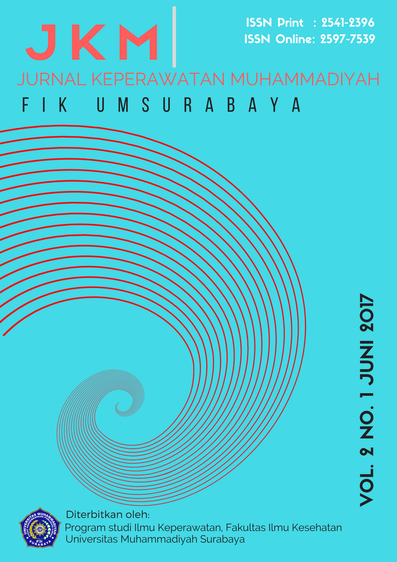Program Self Management Berbasis Mobile Phone pada Pasien Diabetes Melitus Tipe 2
DOI:
https://doi.org/10.30651/jkm.v2i1.1019Abstract
Abstrak
Pendahuluan: Menurut WHO, ada lebih dari 340 juta orang yang terkena DM dan diperkirakan akan menjadi penyebab utama kematian ke 7 pada tahun 2030. Semakin meningkatnya kasus tersebut diperlukan suatu inovasi guna mencegah terjadinya komplikasi dan kematian akibat diabetes melitus. Salah satunya adalah dengan pemanfaatan mobile phone sebagai media dalam program self management pada pasien diabetes melitus tipe 2.
Metode: Metode yang digunakan penulis adalah literatur review. Database yang digunakan penulis adalah PROQUEST,Ebsco dan Science Direct dengan menggunakan kata kunci mobile phone, self management, diabates.
Hasil : Program self management berbasis mobile phone pada pasien diabetes tipe 2 ini menggunakan beberapa fitur serta aplikasi yang dikembangkan untuk program self management ini. Adapun fitur yang digunakan adalah pesan layanan singkat (SMS) Serta aplikasi-aplikasi yang dibuat dan diaplikasikan dengan menggunakan smarthphone. Program self care berbasis mobile phone dapat meningkat self care pada pasie DM tipe 2.
Kesimpulan: Program Self-management berbasis mobile phone pada pasien diabetes melitus tipe 2 merupakan inovasi dalam dunia kesehatan yang bisa digunakan dalam meningkatkan perawatan untuk mencegah komplikasi serta angka kesakitan dari penyakit diabetes melitus.
Kata kunci: mobile phone, self management, diabates
References
Attridge, M., Creamer, J., Ramsden, M., Cannings-John, R., & Hawthorne, K. (2014). Culturally appropriate health education for people in ethnic minority groups with type 2 diabetes mellitus. The Cochrane Database Of Systematic Reviews, (9), CD006424. https://doi.org/10.1002/14651858.CD006424.pub3
Call, R. J., Wofford, M. R., & Riche, D. M. (2012). Top 10 facts you should know about diabetes. Journal Of The Mississippi State Medical Association, 53(8), 275–277. Retrieved from http://search.ebscohost.com/login.aspx?direct=true&db=mnh&AN=23094391&site=ehost-live
Guo, S. H.-M., Chang, H.-K., & Lin, C.-Y. (2015). Impact of Mobile Diabetes Self-Care System on patients’ knowledge, behavior and efficacy. Computers in Industry, 69, 22–29. https://doi.org/10.1016/j.compind.2014.11.001
Hussein, W. I., Hasan, K., & Jaradat, A. A. (2011). Effectiveness of mobile phone short message service on diabetes mellitus management; the SMS-DM study. Diabetes Research and Clinical Practice, 94(1), e24–e26. https://doi.org/10.1016/j.diabres.2011.07.025
Lyles, C. R., Grothaus, L., Reid, R. J., Sarkar, U., & Ralston, J. D. (2012). Communication About Diabetes Risk Factors During Between-Visit Encounters. American Journal of Managed Care, 18(12), 807–816. Retrieved from http://search.ebscohost.com/login.aspx?direct=true&db=rzh&AN=104236727&site=ehost-live
Meng, X. H., Huang, Y. X., Rao, D. P., Zhang, Q., & Liu, Q. (2013). Comparison of three data mining models for predicting diabetes or prediabetes by risk factors. Kaohsiung Journal of Medical Sciences, 29(2), 93–99. https://doi.org/10.1016/j.kjms.2012.08.016
Molton, J. S., Pang, Y., Wang, Z., Qiu, B., Wu, P., Rahman-Shepherd, A., … Paton, N. I. (2016). Prospective single-arm interventional pilot study to assess a smartphone-based system for measuring and supporting adherence to medication. BMJ Open, 6(12), e014194. https://doi.org/10.1136/bmjopen-2016-014194
Peimani, M., Rambod, C., Omidvar, M., Larijani, B., Ghodssi-Ghassemabadi, R., Tootee, A., & Esfahani, E. N. (2016). Effectiveness of short message service-based intervention (SMS) on self-care in type 2 diabetes: A feasibility study. Primary Care Diabetes, 10(4), 251–258. https://doi.org/10.1016/j.pcd.2015.11.001
Qureshi, R. (2016). Ericsson Mobility Report. Ericsson, (June), 1–32. https://doi.org/10.3103/S0005105510050031
Van Olmen, J., Kegels, G., Korachais, C., de Man, J., Van Acker, K., Kalobu, J. C., … Schellevis, F. (2017). The effect of text message support on diabetes self-management in developing countries – A randomised trial. Journal of Clinical and Translational Endocrinology, 7, 33–41. https://doi.org/10.1016/j.jcte.2016.12.005
Wood, F. G., Alley, E., Baer, S., & Johnson, R. (2015). Interactive Multimedia Tailored to Improve Diabetes Self-Management. Nursing Clinics of North America, 50(3), 565–576. https://doi.org/10.1016/j.cnur.2015.05.009
World Health Organization. (2016). Global Report on Diabetes. Isbn, 978, 88. https://doi.org/ISBN 978 92 4 156525 7
Zhou, W., Chen, M., Yuan, J., & Sun, Y. (2016). Welltang - A smart phone-based diabetes management application - Improves blood glucose control in Chinese people with diabetes. Diabetes Research and Clinical Practice, 116, 105–110. https://doi.org/10.1016/j.diabres.2016.03.018
Downloads
Published
Issue
Section
License
- Penulis tetap memegang hak atas karyanya dan memberikan hak publikasi pertama kepada jurnal ini yang secara simultan karya tersebut dilisensikan di bawah:Â Creative Commons Attribution-ShareAlike 4.0 International (CC BY-SA 4.0)













